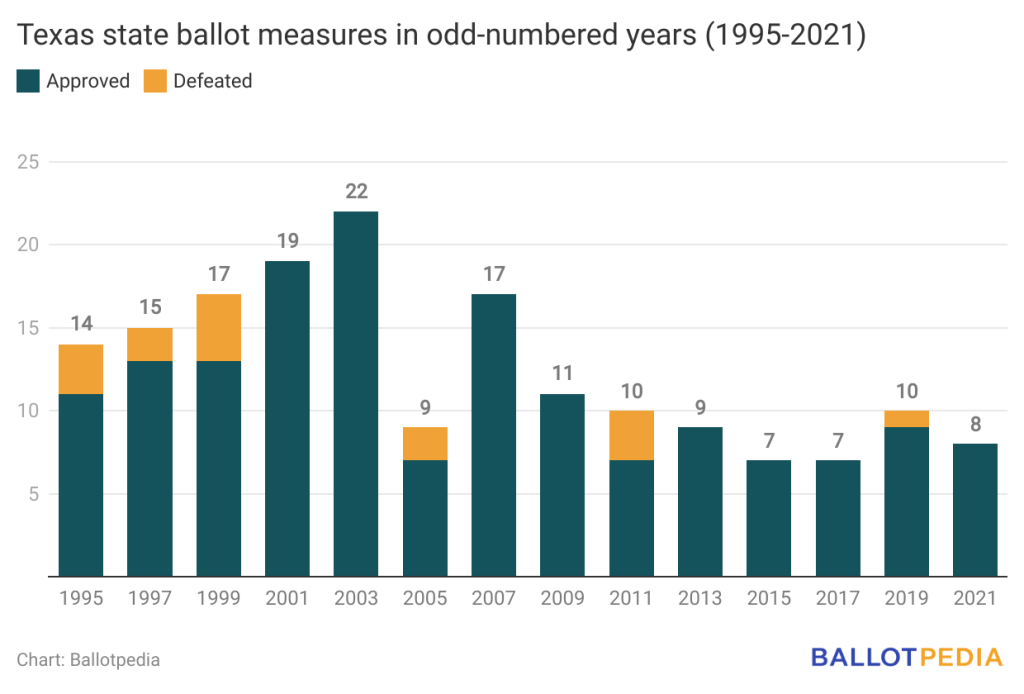The Texas State Legislature convened its 2023 regular legislative session on Jan. 10. The legislature can refer constitutional amendments, in the form of statewide ballot measures, to the ballot in odd-numbered and even-numbered years. However, Texas is one of four states with biennial legislative sessions that meet in odd-numbered years; therefore, most amendments have been referred to ballots in odd-numbered years.

Texas is one of 16 states that requires a two-thirds vote in each legislative chamber during one legislative session to refer a constitutional amendment to the ballot. That amounts to a minimum of 100 votes in the Texas House of Representatives and 21 votes in the Texas Senate, assuming no vacancies.
At the general election on November 8, 2022, Republicans retained control of the House and Senate, increasing their majorities in each chamber to 86-64 and 19-12, respectively. This means that Republicans cannot pass amendments without at least some support from Democrats – at minimum, 14 Democrats in the House and two in the Senate.
In 2022, the last election in Texas featuring constitutional amendments, both amendments received unanimous support from voting Democrats and Republicans.
As of Jan. 13, 96 constitutional amendments have been filed in the Texas State Legislature for the 2023 ballot.
- Democrats filed 49 (51.0%) of the constitutional amendments.
- Republicans filed 47 (49.0%) of the constitutional amendments.
- 72 (75.0%) of the constitutional amendments were filed in the House.
- 24 (25.0%) of the constitutional amendments were filed in the Senate.
In Texas, a total of 281 ballot measures appeared on statewide ballots between 1985 and 2022. Two hundred forty-seven (248) ballot measures were approved, and 33 ballot measures were defeated. The topics that were addressed most by the measures were taxes, bonds, and the administration of government. An average of 14 measures appeared on odd-numbered year statewide ballots.
Texas is one of 16 states that requires a two-thirds vote in each legislative chamber during one legislative session to refer a constitutional amendment to the ballot. That amounts to a minimum of 100 votes in the Texas House of Representatives and 21 votes in the Texas Senate, assuming no vacancies.
At the general election on November 8, 2022, Republicans retained control of the House and Senate, increasing their majorities in each chamber to 86-64 and 19-12, respectively. This means that Republicans cannot pass amendments without at least some support from Democrats – at minimum, 14 Democrats in the House and two in the Senate.
In 2022, the last election in Texas featuring constitutional amendments, both amendments received unanimous support from voting Democrats and Republicans.
As of Jan. 13, 96 constitutional amendments have been filed in the Texas State Legislature for the 2023 ballot.
- Democrats filed 49 (51.0%) of the constitutional amendments.
- Republicans filed 47 (49.0%) of the constitutional amendments.
- 72 (75.0%) of the constitutional amendments were filed in the House.
- 24 (25.0%) of the constitutional amendments were filed in the Senate.
In Texas, a total of 281 ballot measures appeared on statewide ballots between 1985 and 2022. Two hundred forty-seven (248) ballot measures were approved, and 33 ballot measures were defeated. The topics that were addressed most by the measures were taxes, bonds, and the administration of government. An average of 14 measures appeared on odd-numbered year statewide ballots.


